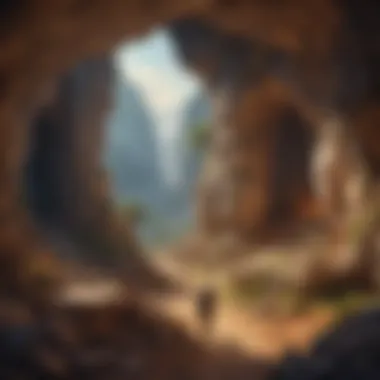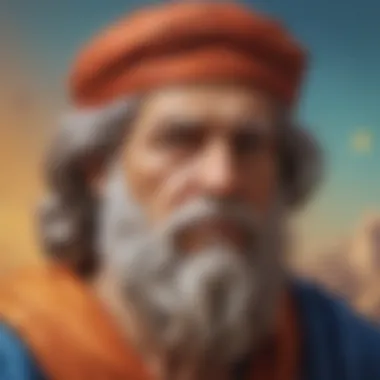Exploring Plato's The Republic: Key Themes and Insights


Intro
Plato's The Republic stands as one of the monumental texts in Western philosophy. It awkwardly combines politics, ethics, and the quest for justice, forming a tapestry that invites readers to ponder the very nature of their existence. In a world where we often glide through surface-level understandings, this dialogue pulls us into deeper waters. It poses challenging questions: What does the ideal society look like? How should individuals live in harmony within that society? Through a series of conversations, primarily featuring Socrates, Plato stimulates profound introspection.
Delving into this work offers not just academic insights but also personal growth. Whether you’re a student grappling with challenging concepts, a professional seeking clarity in complex dilemmas, or simply an avid reader with a thirst for knowledge, there’s a treasure trove of wisdom to uncover.
Embarking on this journey through The Republic enables us to connect its ancient ideas with contemporary relevance. This exploration promises to be enriching for anyone inclined to consider the weighty notions of justice, morality, and the structure of society.
Categories of Life-Changing Books
Books have the incredible power to transform our lives. They shape our thoughts, inspire actions, and provide new perspectives on the world around us. When we consider The Republic, it finds its place among a select category of life-changing literature that cultivates critical thinking and encourages self-reflection.
Self-Help and Personal Development
While The Republic may not fit neatly into the typical self-help genre, its lessons encourage personal exploration and growth. Readers may discover insights that catalyze change in their lives. This work encourages individuals to examine their beliefs and values, pushing them to align their actions with a deeper understanding of justice and the good. For instance:
- It helps to evaluate our own roles in society and how we contribute to it.
- The dialogues urge us to take responsibility for our choices, fostering a proactive approach to personal development.
Fiction with Transformative Themes
Fiction, even when it leans toward philosophical discourse, has the potential to change how we view reality. Themes in The Republic, such as the allegory of the cave, can be seen as a narrative that illustrates the struggle for enlightenment. The work often questions the nature of reality and shadows that men cling to. This makes it a worthy meditation on the human condition.
- The exploration of the philosopher-king challenges the reader to think of leadership as a profound responsibility, rather than a mere power play.
- The discussions of virtue and knowledge can propel a reader to reevaluate their relationship with truth and understanding.
Book Summaries and Insights
An entire world resides within the pages of The Republic. To extract the wisdom contained within, one needs to dissect its structure and key arguments.
Key Takeaways from Popular Titles
When you immerse yourself in The Republic, here are some focal points to retain:
- Justice: The core theme revolves around what it means to live justly, both individually and collectively.
- The Ideal State: Plato’s vision of a perfect state remains a talking point for political theorists.
- Education: The text emphasizes the importance of educating future leaders.
How to Apply Insights in Daily Life
Understanding the concepts brought forth in The Republic can be beneficial in mundane interactions as well as in larger societal roles. Individuals may apply the essence of justice in:
- Decision-making processes where moral dilemmas present themselves.
- Conversations that require engaging with diverse viewpoints fostering understanding.
Engaging with The Republic offers not just philosophical enrichment but an opportunity for personal evolution. As we grapple with its assertions and questions, we unveil facets of ourselves and the world around us, making this a timeless work worthy of contemplation.
"The greatest wealth is to live content with little, for there is never want where the mind is satisfied."
This profound affirmation encapsulates the overarching message of The Republic, urging us to cultivate inner richness rather than labeling material power as the utmost desire.
Preface to The Republic
Plato's The Republic stands as one of the cornerstones of Western philosophy and political theory. Its significance transcends mere academic study, serving as a profound exploration of justice, morality, and the essence of an ideal state. This foundational text invites readers to ponder deep philosophical questions while gaining insight into the ancient world. Understanding The Republic is essential not just for philosophy students, but for anyone wishing to engage with the ideas that continue to shape modern thought.
Historical Context
To fully grasp the weight of The Republic, it’s beneficial to situate it within its historical backdrop. Written around 380 BC, this work emerges from the ashes of a tumultuous period in Athens, following the Peloponnesian War. The city-state was rife with political instability, social upheaval, and a questioning of traditional values. Plato, living in this chaos, was deeply influenced by the decline of democracy in Athens, which he perceived as a breeding ground for injustice.
In such a context, the philosophical dialogues within The Republic are not merely abstract discussions; they are fervent responses to the real crises of the day. Notably, the rise of sophistry—where persuasive rhetoric often triumphed over truth—undergirded much of Plato's argumentation. The Republic calls for a society where philosopher-kings, armed with wisdom and virtue, guide citizens toward the common good. Where contemporary politics often seems mired in corruption and self-interest, Plato’s vision strives for a radical departure, aimed at establishing a harmonious society.
Plato's Life and Influences
Plato’s personal experiences molded his philosophical outlook. Born around 427 BC into an aristocratic family, he witnessed the trials and tribulations of the Athenian political landscape firsthand. His teacher, Socrates, profoundly influenced him. The execution of Socrates for allegedly corrupting the youth of Athens left a significant mark on Plato, intensifying his commitment to uncovering the bedrock of justice and ethics.
Moreover, Plato’s travels beyond Greece enriched his intellectual palette. His encounters with various cultures introduced him to different governance systems and philosophical ideas, fueling his critiques of Athenian democracy. During his sojourn in Egypt, for example, he became familiar with various mystical traditions, adding layers to his understanding of knowledge and its hierarchy.
Through these experiences, Plato shaped his vision of an ideal state—a realm governed by wisdom rather than by the whims of the populace. His philosophical inquiries in The Republic reflect not only his theoretical ideals but also his lived reality and the societal challenges he sought to address. This blend of personal conviction and rigorous inquiry forms the backbone of The Republic, beckoning readers to consider the implications of justice, power, and governance.


"We can easily forgive a child who is afraid of the dark; the real tragedy of life is when men are afraid of the light." — Plato
Plato's thoughts encourage a continual reflection on the pivotal concepts that underpin human existence. By delving into this text, readers open themselves to a rich tapestry of philosophical exploration that echoes through history into modernity.
Structure of The Republic
Understanding the structure of The Republic is vital for grasping Plato's intricate philosophical arguments. The way the dialogues are constructed not only reflects the ideas being discussed but also elucidates the nature of philosophical inquiry itself. The text is not merely a collection of essays or monologues; it is presented as a rich tapestry of conversation and debate, which embodies the dialectical method that Socrates so famously employed. This structure invites readers to engage actively with the content, making the learning experience dynamic and profound.
Dialogue Format
The format of the dialogue is fundamental to the essence of The Republic. Written as a series of interactions primarily between Socrates and his interlocutors, the dialogue format serves multiple purposes. Firstly, it brings a sense of immediacy and liveliness to the philosophical discourse. Readers can almost imagine themselves in the room, participating in the conversations.
Furthermore, the dialogue showcases the Socratic method, which emphasizes questioning and dialogue over mere didactic teaching. Through this back-and-forth style, readers witness ideas being put to the test. Characters disagree, debate, and refine their thoughts in real time, illustrating the fluid nature of knowledge and understanding. This method demonstrates that philosophy is not a destination but a journey, one that often reveals more questions than answers.
In addition, the dialogue format effectively exposes different viewpoints, helping to create a holistic understanding of justice, the ideal state, and other crucial themes present in the text. By contrasting Socratic beliefs with assertions from figures such as Thrasymachus and Glaucon, the reader is encouraged to critically analyze each perspective, leading to a more rounded comprehension of the philosophical inquiries at hand.
Book-by-Book Breakdown
Another significant aspect of the structure of The Republic is its organization into ten distinct books. Each book tackles different facets of Plato’s ideas, allowing the reader to digest complex concepts in a systematic way.
- Book One sets the stage for the examination of justice. It introduces key characters and lays the groundwork for the discussions that will unfold.
- Books Two through Five delve into the idea of the ideal state and its construction, including the famous notion of the "Philosopher-King."
- Book Six discusses the nature of the philosopher and what distinguishes them from the ordinary citizen.
- Book Seven presents the Allegory of the Cave, a pivotal metaphor that examines the difference between the world of appearances and the world of forms.
- Books Eight and Nine transition to the exploration of different types of government and their implications for the soul and society.
- Book Ten concludes with a critical examination of poetry and its place in the ideal state, questioning its value in understanding truth.
This structured approach aids readers in following the development of arguments and ideas logically. Each book builds on its predecessor, creating a sense of progression and deepening understanding. By breaking down the content in this way, Plato crafts an accessible yet sophisticated narrative that resonates with both novices and seasoned readers alike.
In essence, the structure of The Republic—from its dialogue format to its book breakdown—works in harmony to enhance the philosophical inquiry within the text. It invites critical thinking and active engagement, encouraging readers to not just absorb ideas but to explore and evaluate them through reasoned discussion.
Key Themes and Concepts
Plato's The Republic is not merely a philosophical treatise; it's a profound exploration of concepts that remain relevant to various fields of study today. Each theme within this work sheds light on fundamental questions that concern human existence and societal structure. The examination of themes such as justice, the ideal state, and education are particularly salient, revealing the intricacies of Plato's vision and offering critical insights into the functioning of society.
Justice and Injustice
Justice is painted as the bedrock of Plato's philosophy, serving as the primary theme throughout The Republic. It’s not just a legal concept but a moral one, reflecting the harmony between the individual and society. In the first book, Thrasymachus presents a view that justice is merely the advantage of the stronger. However, Socrates challenges this notion, arguing that true justice leads to the well-being of all, rather than serving the whims of the powerful.
This dichotomy between justice and injustice raises vital questions about ethics that resonate even today. The misalignment of personal interests with collective good is a recurring motif, urging readers to reflect on their own societal structures— is the law truly just, or are there undertones of oppression?
Additionally, the implications of justice extend to the realm of personal character. The just person, as Socrates illustrates, is one who seeks harmony within themselves, creating a parallel with a just society. A society steeped in justice tends to flourish, while one riddled with injustice will inevitably falter.
The Ideal State
Plato's ideal state, delineated through rigorous dialogues, suggests a society governed by philosopher-kings—those who possess not just knowledge but wisdom. At the heart of this concept is the belief that only individuals who understand the essence of the good should lead, as they are best equipped to forge a society that thrives. Their governance isn't based on personal gain or ambition, but rather on an aspiring vision for collective betterment.
Interestingly, this idea raises questions not only about leadership but also about the nature of power. Who wields it, how it is acquired, and what responsibilities accompany it? These considerations become critical as we analyze political frameworks today. Plato's discourse further distinguishes between three classes—rulers, auxiliaries, and producers—suggesting a functionalist approach to societal roles.
"The heaviest penalties will be inflicted on those who take no part in politics, for they do not fulfill their duties as citizens."
This reference implies the active engagement of citizens in governance, prompting a discussion on political responsibility. Each class, as per Plato's view, contributes to the well-being of the state, allowing for sustainable societal growth. This echoes in debates about meritocracy and the age-old question of ‘who is fit to rule?’
Education and Knowledge
Education is portrayed in The Republic as the fundamental mechanism for achieving a just society. However, Plato's perspective on education is not merely about rote learning; it encompasses a holistic development of character and intellect. The famous Allegory of the Cave illustrates the journey from ignorance to enlightenment, emphasizing that knowledge is a transformative force.
Education feeds directly into the notion of the philosopher-king. The idea is that the right kind of education is essential for leaders—it shapes understanding, nurtures virtue, and ultimately empowers one to grasp the complexities of human existence. Plato argues that education should be rigorous, involving not just learning facts but cultivating critical thinking and ethical awareness.
In modern contexts, The Republic prompts us to reevaluate our own educational frameworks. Are they promoting true knowledge, or are they merely outlets for vocational training? Are we equipping individuals with the skills necessary to think critically and act ethically within society? The theme of education emerges as a catalyst for social change and a prerequisite for civilizational progress.
In essence, the interplay between justice, the ideal state, and education in Plato's The Republic provides a sturdy framework for analyzing contemporary societal issues. These themes challenge readers to think deeply about their own lives and the structures within which they operate, influencing generations of thinkers and scholars across various disciplines.
The Allegory of the Cave
The Allegory of the Cave serves as a pivotal aspect of Plato's The Republic, illuminating profound philosophical arguments regarding perception, knowledge, and reality. Within this allegory, Plato paints a vivid image of prisoners who are chained inside a dark cave, only able to see shadows cast on the wall. This powerful metaphor encapsulates the journey from ignorance to enlightenment, and it’s worth exploring this narrative to unlock its deeper meanings.
Interpretation and Implications


The interpretation of the Allegory of the Cave extends far beyond its literal narrative. It is a commentary on the human condition and the challenges of philosophical thinking. The shadows in the cave symbolize false realities and the limited understanding that individuals often accept as truth. Plato suggests that most people live among illusions, taking the shadows at face value without questioning their existence or source.
When one of the prisoners escapes and discovers the world outside the cave, this journey symbolizes the philosophical pursuit of knowledge and truth. The sunlight represents the ultimate form of knowledge—the Form of the Good—which informs all other understanding. This implication pushes readers to reflect on their own perceptions and challenges them to seek enlightenment through critical thinking and questioning established norms.
"The unexamined life is not worth living."
— Socrates, through the voice of Plato.
As such, the allegory carries significant implications for education and personal growth. It suggests that enlightenment comes from rigorously seeking knowledge, as well as the willingness to leave one's comfort zone. This perspective has practical applications in contemporary society, where misinformation can easily cloud judgment.
Philosophical Relevance
The philosophical relevance of the Allegory of the Cave cannot be overstated. It addresses the nature of reality and the epistemological question of how we know what we claim to know. The allegory serves as an exploration of reality versus appearance, raising crucial questions about belief and knowledge.
In today’s world, concepts drawn from this allegory find significance in various fields, from sociology to psychology. The notion that perceptions are influenced by surrounding stimuli resonates in discussions about media influence and societal norms. Furthermore, this allegory acts as a cautionary tale about the dangers of accepting superficial knowledge without scrutiny.
In essence, the Allegory of the Cave provides a foundational framework for understanding critical philosophical ideas. It encourages readers to consider the depths of their own cognitive landscapes and to strive for a more profound grasp of reality. By doing so, one may transition from the shadows to the engaging light of true understanding.
Empowered with the insights drawn from this allegory, readers can appreciate the relevance of Plato’s thought in a society that often grapples with illusion versus reality. This timeless piece speaks to the intellect's enduring quest for truth in a complex world.
Character Analysis
In Plato's The Republic, character analysis plays an essential role in understanding the dialogues and their philosophical arguments. Each character embodies different perspectives, challenging or reinforcing the various themes in the text. Studying these characters allows readers to grasp complex concepts such as justice, the ideal state, and the nature of knowledge. While engaging with the unique traits and motives of the characters, one attains deeper insight into not only their positions but also how they reflect the society of Plato's time.
Socrates as a Central Figure
Socrates serves as the primary voice in The Republic, guiding discussions with his well-known method of questioning. Throughout the text, he is often portrayed as the epitome of wisdom. His dialectical style forces other characters, such as Glaucon and Thrasymachus, to clarify their ideas and assumptions. For instance, Socrates famously challenges Thrasymachus’s assertion that justice is simply the advantage of the stronger. Unlike most philosophers of his time, Socrates doesn’t offer definitive answers; rather, he encourages continuous inquiry. This technique ultimately helps to reveal the many layers of the concept of justice.
Socrates' role is not just limited to his arguments. His character represents the philosopher's quest for truth and the moral responsibility that comes with it. He embodies the pursuit of knowledge, demonstrating the need for self-awareness in ethical considerations. This makes Socrates a relevant figure even today, as his principles of critical thinking and ethical examination remain foundational in philosophical discussions.
Thrasymachus and the Challenge to Justice
Thrasymachus stands in sharp contrast to Socrates. He represents a more cynical view of justice, asserting that it is merely a construct designed to benefit the powerful. Thrasymachus’s provocative assertions force Socrates to defend the notion of justice, illuminating a vital debate that runs throughout The Republic. By claiming that injustice can be more profitable than justice, he highlights the potential flaws within societal norms.
His arguments lead to a deeper exploration of moral philosophy, raising questions about the relationship between power and ethics. Does might make right? or Is it beneficial to act unjustly? These are the kinds of inquiries that emerge from the interactions with Thrasymachus. The very existence of his character serves to showcase the ideological struggles inherent in Plato's exploration of ethics and governance.
Glaucon and Adeimantus
Glaucon and Adeimantus, Socrates's interlocutors, bring unique perspectives that enrich the dialogue. Glaucon is especially notable for his challenge to Socrates, as he asks whether justice is intrinsically valuable or merely a means to an end. His famous story of the Ring of Gyges posits that if individuals could act unjustly without fear of punishment, they would do so. This hypothetical scenario serves as a vehicle for discussion regarding the intrinsic nature of justice versus the motivations behind just behavior.
Adeimantus further probes into the implications of justice from a societal standpoint. Together, the brothers represent well-rounded critiques of justice and morality, pushing the dialogue deeper into the realms of societal values and personal ethics. Their contributions allow the dialogue to broaden and include critical considerations on how justice impacts both the individual and the state.
By analyzing these characters within The Republic, readers gain invaluable insights into Plato's philosophical inquiries. Understanding their roles and arguments helps illuminate key tenets of justice, ethics, and the ideal state. Ultimately, this character analysis not only enhances comprehension but also prompts reflection on contemporary relevance—a testament to the enduring nature of Plato's work.
Philosophical Contributions
When we delve into the philosophical contributions of The Republic, it becomes clear that this work is not just a cornerstone of Western philosophy but also a vibrant source that continues to stimulate discourse today. Plato masterfully blends normative questions about morality, justice, and the ideal society with profound insights into human nature. His ideas laid the groundwork for numerous philosophical traditions and sought answers to some of humanity's most pressing queries. By exploring its contributions, we uncover layers of understanding about ethics, epistemology, and the nature of statecraft that remain relevant in today's societal context.
Influence on Western Philosophy
Plato’s The Republic has been a pivotal text shaping the course of Western thought. It is difficult to overstate its impact, which reverberates through centuries. The dialogues presented within the text are crucial for forming the basis of various philosophical branches:
- Ethics: The discussions on justice and virtue carry weighty implications for ethical theory. Is justice always beneficial? How do individual actions align with the collective good? These inquiries initiate far-reaching debates found in subsequent philosophical literature.
- Political Philosophy: Concepts of the ideal state presented by Plato have sparked discussions resembling the outlines of various political ideologies. Thinkers like John Locke and Karl Marx trace their arguments back to the dialogues of The Republic.
- Epistemology: The allegory of the cave, which delves into the nature of knowledge and belief, positions Plato at the forefront of epistemological exploration. His thoughts on the difference between the world of appearances and the world of forms raise questions about perception's reliability that continue to challenge philosophers today.
Overall, The Republic serves as a foundational work that not only delineates ideals but also critiques the systems in place, paving the way for an engaged discourse well into modern societies.
Responses from Later Philosophers
Many later philosophers have offered their critiques and expansions based on the ideas presented in The Republic. Some noteworthy responses include:
- Aristotle's Critique: As a student of Plato, Aristotle provided critical feedback, particularly on Plato's theories of forms and his ideas about governance. Aristotle’s assertion that the ideal government must consider human nature directly contrasted with Plato's abstract idealism.
- Hegel's Dialectic: The German philosopher Hegel appreciated The Republic's ambition to realize the ideal state but proposed that human freedom develops through history, placing less emphasis on the static view of ideals.
- Rawls' Justice Theory: In the 20th century, John Rawls drew inspiration from Plato, especially concerning justice and fairness. His theories echo the dialogues in The Republic while offering a modern perspective that reflects contemporary society’s values.
Plato's influence is not merely a theoretical footnote; it builds the bridge from ancient philosophy to modern-day discourse. Philosophers continually engage with his ideas, either by standing on his shoulders or pushing against his foundational concepts as they navigate the complexities of moral and ethical thought that characterize the human experience.
"The unexamined life is not worth living." - Socrates in The Republic


This succinctly illustrates the spirit of inquiry that Plato champions, urging every generation to critically evaluate their beliefs and values. As we unpack these philosophical contributions, we see that The Republic serves as a lifelong companion for those committed to understanding themselves and the world around them.
Modern Interpretations
The exploration of Plato's The Republic is not just an academic endeavor, it has significant implications that stretch into today’s ideologies and practices. Modern interpretations breathe new life into Plato's thoughts, highlighting how timeless his philosophical inquiries are. This section reflects on pertinent elements concerning the contemporary relevance of The Republic, and how it influences the thinking of students, professionals, and avid readers alike. By delving into the depth of Plato’s arguments, one can glean insights that resonate with modern dilemmas and sociopolitical challenges.
Relevance in Contemporary Society
In today’s fast-paced world, the themes presented in The Republic still echo in various realms. Take, for instance, the quest for justice. Much like Socrates’ dialogues exploring the essence of justice, modern society continues to grapple with the balance between societal good and individual rights. The discussions surrounding justice in The Republic can be seen mirrored in today’s debates over systemic inequality, political corruption, and social reforms.
- Social Justice Movements
Current movements, such as Black Lives Matter and climate advocacy groups, often invoke principles that one might find akin to Plato’s thoughts on what makes a society just and good. These movements challenge the status quo, urging for structures that reflect justice not only as a principle but as a lived reality. - Ethical Governance
In political discourse, elements of the ideal state presented by Plato urge contemporary leaders to rethink their priorities, ensuring that governmental powers align with the greater good for all citizens. This has become particularly relevant as the public demands accountability and ethical standards in leadership.
Thus, interpreting The Republic through a modern lens allows us to assess how its philosophical inquiries support or oppose current societal norms.
Applications in Political Theory
When analyzing the frameworks established in The Republic, one can see their applications in contemporary political theory. The dialogues initiated by Socrates around governance, authority, and morality shape debates within many political ideologies today.
- The Concept of the Philosopher-King
Plato posited that only a philosopher could effectively rule. Whether this idea stands the test of modern scrutiny remains debatable, yet it provokes a compelling discussion about the qualifications of leaders in both democratic and authoritarian regimes. Philosophers and political theorists today frequently reference this ideal when critiquing political systems. - Theory of Forms and Ideal Societies
The concept of forms—ideal versions of concepts—also resonates within discussions on utopian societies. Scholars often invoke this theory while evaluating the feasibility of creating a perfect society, questioning what such a society would truly require or entail.
"Plato's The Republic not only critiques existing structures but also presents aspirational visions for political integrity and social harmony."
- Influence on Democratic Ideals
Moreover, Plato's insights on governance continue to influence democratic theorists who advocate for participatory governance and community engagement, emphasizing the importance of education in cultivating informed citizens who can contribute meaningfully to society’s governance process.
In summary, by looking at The Republic through contemporary eyes, we unveil layers of discourse that remain pertinent, inviting rigorous debate and offering rich insights into our ongoing quest for justice and good governance.
Critiques of The Republic
Understanding the critiques of The Republic is crucial for grasping the broader implications of Plato's thoughts. Such critiques illuminate where the philosophical idealism of the text intersects with the practical realities of human societies. Exploring these objections not only enriches one’s understanding of Plato's vision of justice and governance but also exposes potential flaws and limitations inherent in those ideas. Critics range from ancient philosophers to contemporary thinkers, creating a rich tapestry of discourse that helps to define the legacy and relevance of Plato’s work across ages.
Philosophical Critiques
Several philosophers have taken issue with the tenets laid out in The Republic, notably concerning the concept of justice and the ideal state. For example, Aristotle, who was Plato's student, directly challenged Plato's notion of a philosopher-king. He argued that such a concentration of power could lead to tyranny rather than a true republic wherein citizens participate in governance. Aristotle’s perspective urges a system that incorporates broader societal involvement rather than an elite ruling class based solely on philosophical knowledge.
Moreover, critics often point to the overarching theme of collectivism in Plato's ideal society. The idea that individuals should put the needs of the state above their own desire raises ethical concerns. Questions abound about personal freedom and self-expression, suggesting that Plato's framework seems more focused on societal harmony than individual rights. These critics assert that a society built solely on collective ideals could infringe on basic human freedoms, leading to a stifling of creativity and personal development.
As troubling as it is enlightening, these critiques of Plato's framework serve as a springboard for ongoing philosophical inquiry. Some scholars argue that the dialogues in The Republic invite such critique, as they set out to explore rather than to dictate absolute truths.
Practical Implications
Stepping back from pure philosophy, the practical implications of Plato’s ideas become evident, especially in areas like governance, education, and social organization. Critics have raised eyebrows at the applicability of his theories in real-world scenarios. For instance, the proposal of a rigid class structure where the Guardians rule, the Auxiliaries defend, and the Producers supply fundamentally contradicts modern principles of democracy and equality. Critics argue that implementing such a stratified system may lead to societal unrest and diminish the concepts of meritocracy that are vital today.
In place of Plato's guardianship, contemporary political theories advocate for inclusivity in decision-making processes. This evolution acknowledges that diverse perspectives yield more comprehensive solutions that honor varied experiences and expertise across society.
Another practical concern revolves around Plato's vision of education—a system designed to sift the very best from the populace to fill the roles of Guardians. Critics contend this elitist educational model ignores the potential contributions of every individual, regardless of social class. Instead of elevating a select few, modern educational philosophies emphasize fostering potential within all members of society.
In essence, critiques reveal the necessity to balance idealism with pragmatism. Rather than merely dismissing Plato's visions, it is more insightful to integrate his ideas with what has evolved through centuries of human thought, fostering discussions that can reshape the philosophical landscape for the better.
"The unexamined life is not worth living." - Socrates
Concluding Thoughts
As we wind down our comprehensive exploration of The Republic, it's crucial to reflect on its enduring relevance. Plato’s work is not just an ancient text; it’s a living dialogue that still resonates through centuries. It has shaped thoughts about justice, governance, and morality in ways that continue to challenge and inspire. The layers of meaning in The Republic allow readers to engage with profound questions about human nature and the ideal society.
Legacy of The Republic
The Republic holds a significant place in both the history of philosophy and the broader cultural narrative. Its legacy can be observed through various lenses:
- Foundational Philosophical Text: Plato’s arguments about justice and the ideal state set the groundwork for many philosophical inquiries that followed. Philosophers from Aristotle to modern thinkers like John Rawls have interacted with these concepts, either building on or critiquing them.
- Influence on Political Theory: The dialogues in The Republic introduce ideas like the philosopher-king and the role of education in governance, which are foundational for modern political theories. The discussions remain relevant in today's political landscape, where the relationship between power and justice is ever-pertinent.
- Cultural Resonance: Beyond academia, The Republic permeates literature, art, and contemporary discussions in media. Its themes have inspired countless adaptations, interpretations, and even critiques in diverse formats, from modern novels to films.
It’s important to recognize that rather than providing definitive answers, The Republic sparks ongoing discourse, inviting readers to explore their own philosophical inquiries and dilemmas.
The Importance of Philosophical Inquiry
Engaging with The Republic embodies the essence of philosophical inquiry. This process is essential not only for developing critical thinking skills but also for fostering a nuanced understanding of the world.
Philosophical inquiry encourages:
- Critical Analysis: Readers are invited to question their beliefs and assumptions. The Republic serves as a catalyst for examining the principles of justice and ethics, prompting deeper reflection on what constitutes a just society.
- Intellectual Curiosity: The text inspires a thirst for knowledge, pushing individuals to explore philosophical texts and ideas beyond Plato. It’s a doorway into a vast realm of thought, engaging minds in quest for truth and understanding.
- Open Dialogue: The dialogue format of The Republic exemplifies the value of discourse and debate. In a world often divided, engaging with its themes can inspire conversations about ethics, leadership, and community that are essential for societal growth.
In totality, The Republic reflects the journey of philosophical inquiry, one that seeks to answer not only age-old questions but also the pressing concerns of our modern lives. For students, professionals, and avid readers, this journey fosters a deeper recognition of the complexities surrounding justice, governance, and human nature.















